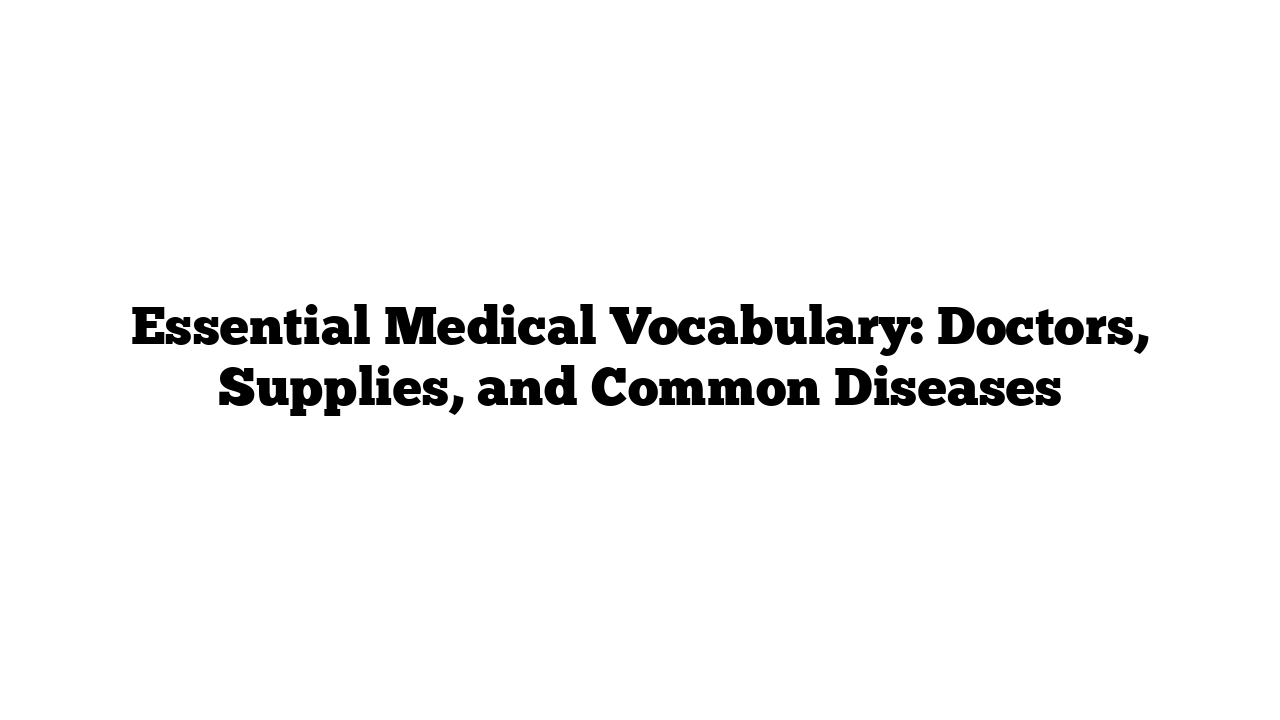Understanding medical vocabulary is essential for anyone navigating the healthcare system, whether you’re looking for a job in a hospital or just need to communicate effectively with your doctor. This guide will introduce you to important terms related to types of doctors, medical supplies, and common diseases.
Types of Doctors
Here’s a list of various specialists you might encounter:
- Anesthesiologist: A doctor specializing in anesthesia and pain management.
- Cardiologist: A heart specialist who diagnoses and treats heart conditions.
- Consulting Doctor: A physician who provides expert advice on medical issues.
- Dentist: A healthcare professional focused on oral health.
- Dermatologist: A specialist in skin, hair, and nail disorders.
- Dietician: An expert in nutrition and dietary planning.
- ENT Doctor: An ear, nose, and throat specialist.
- Epidemiologist: A doctor who studies the spread and control of diseases.
- Family Doctor: A general practitioner who provides comprehensive health care.
- General Practitioner: A physician who treats a wide range of health issues.
- Infectious Disease Doctor: A specialist in diseases caused by germs.
- Medical Examiner: A doctor who investigates causes of death.
- Nurse: A trained professional who provides patient care.
- Obstetrician: A doctor who specializes in pregnancy and childbirth.
- Oncologist: A cancer specialist who diagnoses and treats cancer.
- Ophthalmologist: An eye care specialist who performs surgeries and provides vision care.
- Paramedic: An emergency medical technician who provides advanced care in emergencies.
- Pharmacist: A healthcare professional who dispenses medications.
- Psychologist: A specialist who studies mental processes and behavior.
- Specialist Doctor: A physician with advanced training in a specific field.
- Surgeon: A doctor who performs surgical procedures.
- Veterinarian: A doctor who treats animals.
Medical Supplies
Knowing the right medical supplies can help in emergencies and when visiting a doctor. Here are some key terms:
- Ambulance: A vehicle equipped for transporting the sick or injured.
- Antiseptic: A substance that prevents infection by killing germs.
- Bandage: A strip of material used to cover a wound.
- Blood Pressure Monitor: A device to measure blood pressure.
- Blood Test Kits: Tools used for collecting and analyzing blood samples.
- Crutch: A support used by a person unable to walk normally.
- First Aid Kit: A collection of supplies for basic medical treatment.
- Glasses: Lenses worn to improve vision.
- Oxygen Masks: Devices that provide oxygen to patients.
- Scalpel: A small knife used in surgery.
- Stethoscope: An instrument used to listen to internal sounds of a patient’s body.
- Thermometer: A device to measure body temperature.
- Wheelchair: A chair mounted on wheels used by individuals who cannot walk.
Common Diseases
Being familiar with common diseases can help you explain symptoms more clearly to a doctor:
- Acne: A skin condition that occurs when hair follicles become clogged.
- Allergy: A condition in which the immune system reacts abnormally to a substance.
- Arthritis: Inflammation of the joints causing pain and stiffness.
- Asthma: A respiratory condition marked by difficulty breathing.
- Backache: Pain in the back, often due to strain or injury.
- Broken Bone: A fracture in a bone.
- Cold: A viral infection causing respiratory symptoms.
- Fever: An elevated body temperature often indicating infection.
- Flu: A contagious respiratory illness caused by influenza viruses.
- Headache: Pain in the head or neck area.
- Heart Attack: A medical emergency where blood flow to the heart is blocked.
- High Blood Pressure: A condition where the force of the blood against the artery walls is too high.
- Muscle Cramp: Sudden, involuntary muscle contraction causing pain.
- Nausea: A feeling of sickness with an inclination to vomit.
- Rash: A change in skin color or texture.
- Sore Eyes: Discomfort or pain in the eyes, often due to irritation or infection.
- Stomach Ache: Pain in the abdominal area.
- Sunburn: Skin damage from excessive sun exposure.
- Toothache: Pain in or around a tooth.
Navigating Your Health
Understanding this vocabulary can make your visits to healthcare professionals smoother and less stressful. Whether you need to explain your symptoms or request specific supplies, having this knowledge empowers you to communicate effectively.
For further information and resources, consider checking out sites like Mayo Clinic or WebMD. Remember, being informed is the first step toward better health!
